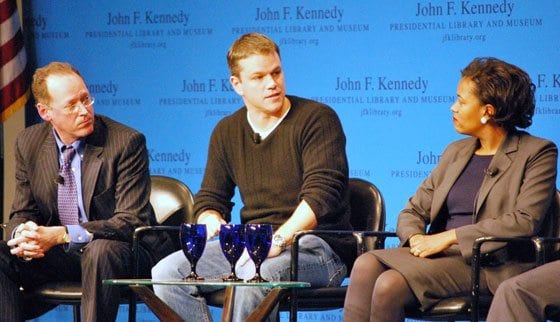
Actor Matt Damon and hip-hop artist Wyclef Jean visited Haiti last September, after a string of storms battered the island. As they surveyed the damage, Damon recalled during a recent seminar at the John F. Kennedy Library and Museum in Boston, the Haitian-born Jean said, “These are not the conditions [that] human beings should be living in.”
Damon was one of many participants in the recent “Change Haiti Can Believe In” seminar, which featured a debate focused mostly on the misery, corruption, natural disasters and reconstruction of the Caribbean nation. A crowd of about 500 people came to the discussion, hoping to hear the latest news about the island.
Established in 1804, Haiti was the first Latin American nation to be freed from slavery. But a series of military actions, including invasions by the French and Americans, and several natural disasters have impeded the Haitian people’s progress.
Today, Haiti’s 9 million people experience severe poverty, compounded by profound social and political perils that range from the country’s problematic infrastructure, insecure job market and unequal education system.
“It’s not an accident … that Haiti has the highest rate of privatized schools in Latin America, and also has a lot of illiteracy,” said Paul Farmer, co-founder of Partners In Health, a nonprofit organization based in Haiti that provides access to health care for hundreds of Haitians.
“Education in Haiti hasn’t been viewed as a people’s right,” he added.
Massachusetts state Rep. Linda Dorcena Forry, a Haitian American who filled the Dorchester seat in Boston of former House Speaker Thomas M. Finneran in 2005, said the country needs a collective answer. She referred to Haiti’s deteriorating political establishment, which has had no free elections from 1804 to the 1990.
“It wouldn’t work if we just solved one problem,” Forry said. “In Haiti, we have to attack everything at the same time: poverty, lack of access to health services, a weak judicial system, and others.”
According to Census figures, there are 420,000 Haitians in the U.S., mostly concentrated in Florida (43 percent) and New York (30 percent). About 8 percent of Haitian immigrants in the U.S. reside in Massachusetts.
Among Haitians in Boston, about 4 percent are business owners, and 21 percent have supervisory or managerial jobs, according to a 2006 survey conducted by the Boston Redevelopment Authority.
“Every year, Haitian émigrés send $1.2 billion to their motherland, resources that go straight to regular families,” said Forry.
For Brian Concannon Jr., a Brandeis University human rights attorney and director of the Institute for Justice and Democracy in Haiti, part of the island’s social vulnerabilities stem from the fact that all foreign aid goes solely to the private sector and nongovernmental organizations.
“When the government lacks the most basic resources, it gets harder and harder to support its peoples,” said Concannon.
Matt Damon visited the Haitian city of Gonaïves shortly after Hurricane Ike struck the island, the fourth major storm to strike the country last year. He said it was easier to promote a Hollywood movie like his hit “The Bourne Supremacy” than it was to get major American TV networks to pay attention to the poverty that is killing many Haitians.
“It was disaster on top of disaster. The smell, the sight of people living on their rooftops 12 days after the hurricane had passed, almost indescribable,” said the actor.
Despite the heavy talk of historical details, at times the discussion seemed light, with the audience even laughing after some comments. Moderator Amy Goodman, host of the “Democracy Now!” radio and TV shows, asked Farmer to talk about the “pink pigs” incidents.
“Haitians love pigs. At one point, the American government cited some health concerns and offered to kill and repopulate the pigs in Haiti,” said Farmer.
Americans brought pigs from Iowa and constructed cement-based structures for the animals. But as Farmer explained, the plan was doomed to fail.
“It would never work. Haitians use pigs as banks. They kill one when they need to send kids to school and buy uniforms,” Farmer said. “Some [say] pigs [in Haiti] have a better life than Christians.’”
Farmer, who is one of the world’s most trusted authorities on Haitian history, summarized the situation in Haiti as “a graveyard of failed projects.”
“Haiti created another concept for orphans, where kids are separated from parents by extreme poverty,” he said.
Damon said that appealing to the world’s sensibility hasn’t helped to solve some of Haiti’s problems, and neither has arguing that “helping Haiti is good for U.S. homeland security.”
“I noticed that only pointing out effective programs works. Because [funders] want to know about the crisis, but more about the proven effective solutions,” Damon said.
Audience member Gisele M. Michel said she found it heartening to see so many people interested in what goes on in Haiti.
“I’m a supporter of any means that will bring attention to [Haiti’s] problems,” said Michel, CEO of the consulting firm Icatalyst LLC. “But it’s important that the person is knowledgeable enough to have an intelligent conversation. If it comes down to including a celebrity, I don’t see anything wrong with it.”
Nadege Volcy, a senior cost analyst at Harvard Medical School who came to the U.S. from Haiti at age 1, said she hopes the Obama administration will extend a helping hand to Haiti.
“Will that work? I don’t know,” Volcy said. “[Obama] inherited a royal mess with global proportions. But so far, I have seen what he’s about. I hope Haiti gets [on] his radar and he’ll address it.”
At the conference’s end, Farmer said it’s common for the world to place blame on Haitians for not overcoming their social hurdles.
“They say it’s part of the culture or somehow wired into their psychology. [They] even blame Haitians’ attitude,” Farmer said. “But I say they’re a wonderful people. They did humanitarian work in Africa with me, and put all their hearts into it.”






